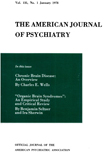PARENTAL DEPRIVATION AND THE "BROKEN HOME" IN DEMENTIA PRÆCOX AND OTHER MENTAL DISORDERS
Abstract
The incidence of parental deprivation and "broken homes" was found to be very similar among individuals suffering from dementia præcox, manic-depressive psychosis, alcoholic state, and "other psychoses," and in normal control subjects. However, it was significantly higher in psychoneurotics and psychopathic personalities. With respect to causes of deprivation, it was noted that mental illness constituted a significant source of parental deprivation in 2 groups only—dementia præcox and manic-depressive psychosis. Divorce, separation, or desertion occurred most frequently in the parents of psychopathic personalities and psychoneurotics. Statistics concerning the age at which deprivation occurred and the parent lost did not exhibit any significant trend. There was apparent tendency for increased incidence of parental deprivation in schizophrenic patients whose illness occurred before the age of 20. The incidence of various types of psychiatric abnormalities was almost identical in the siblings of both deprived and nondeprived patients. The type of psychiatric illness in siblings paralleled that found in the hospitalized patients. It is concluded that the incidence of dementia præcox is unrelated to known external stresses or deprivations. These data lend further support to the etiological importance of heredo-constitutional factors in the development of the major psychoses. Dementia præcox is regarded as a biological deficiency disease based on heredo- constitutional factors. This concept should not lead to an attitude of therapeutic nihilism.
Access content
To read the fulltext, please use one of the options below to sign in or purchase access.- Personal login
- Institutional Login
- Sign in via OpenAthens
- Register for access
-
Please login/register if you wish to pair your device and check access availability.
Not a subscriber?
PsychiatryOnline subscription options offer access to the DSM-5 library, books, journals, CME, and patient resources. This all-in-one virtual library provides psychiatrists and mental health professionals with key resources for diagnosis, treatment, research, and professional development.
Need more help? PsychiatryOnline Customer Service may be reached by emailing [email protected] or by calling 800-368-5777 (in the U.S.) or 703-907-7322 (outside the U.S.).



